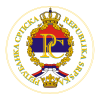

LubriCAD project
„Nanochemistry Solutions in Technical Lubricants Additive Improvements“
Project Goal: Development of new iron nanomaterials with potential as additives in lubricant industry
Target Group: Domestic industry, students of chemistry and mechanical engineering
Project Duration: 01.06.2020.- 01.06.2023.
Source of Funds: Ministry of Scientific and Technological Development and Higher Education co-financed by EIT RM (BlowUp project)
Project resume:
The main objective of the project was to develop a line of iron oxide based lubricant additives. Two promising nanoparticles have been synthesized in this area through the recently completed BlowUp project funded by the EIT RawMaterials Fund (part of Horizon 2020). In the BlowUp project, the iron oxide nanoparticles in the form of cubes have shown excellent potential as the lubricant additive. The LubriCAD project worked mostly on the problematic of their stable dispersions.
Two international partners from this project supported the team through expertise and co-financing the project by valuable highly sophisticated measurements. Specifically, support relates to TEM analysis of nanoparticles, liquid fluorescence particle size analysis, X-ray diffractometry (Italian National Scientific Council), nanotribological measurements on a state-of-the-art tribometer, and Raman spectroscopy (Salerno University).
Co-financing from the economy came from the domestic lubricant factory “Tehnosint“. The main benefit of developing this type of additive would be the reduction of energy use in lubrication-requiring devices, which can achieve energy savings of over 40%. In Republika Srpska, this is especially important in the forestry and mining industries which use thousands of tons of lubricants. So far, international research is based on tests of copper or cobalt particles, more expensive metals whose accumulation in the environment carries health hazards, unlike iron oxide nanoparticles that will be developed through the presented project, which are non-toxic.
The largest part of the budget was related to the procurement of the state-of-the-art infrared spectrometer for the purpose of daily sample analysis, and the project will support the young researchers for few months in order to give them realistic experience in the scientific research in nanochemistry which is the scientific field in rise currently in Republic of Srpska. The equipment was successfully installed and is serving students of the University as well as the collaborating industries.
Two international collaborations were added value of the project. From Santiago de Compostela University in Spain, PhD student, MSc Khodor Nasser, participated and spent 4 months in Banja Luka, through the Erasmus exchange program. As he contributed to the Lubricad, his recently defended PhD thesis holds also the acknowledgement to the project. Also, MSc Dragana Stević, a researcher with 6 years of experience at Shinshu University Nagano, who had recently repatriated, has joined the team. As a holder of two Japanese patents in nanotechnologies, her expertise and connections with the Shinshu University, Nagano, contributed strongly to the final experiments and writing of the scientific paper published from the Lubricad project.
Project news:
- https://hemija.pmf.unibl.org/en/lubricad-project-successful-collaboration-with-young-exchange-researcher/
- https://hemija.pmf.unibl.org/en/state-of-the-art-infrared-spectrophotometer-ready-for-student-and-researcher-activities/
- Научни чланак објављен: https://link.springer.com/article/10.1007/s12649-023-02165-w
- Докторска дисертација са захвалностима ЛубриЦАД пројекту: https://minerva.usc.es/entities/publication/9f2f61cf-8f75-43d0-b590-2f258f3086b3/full
Project team:
- Suzana Gotovac Atlagić Coordinator
University of Banja Luka Faculty of Science
- Vladimiro Dal Santo, Expert
“Giulio Natta” (SCITEC) of the Consiglio Nazionale delle Ricerche (National Research Council – CNR)
- Adolfo Senatore, Expert
Università degli Studi di Salerno, Dipartimento di Ingegneria Industriale
- Milica Balaban, Expert
University of Banja Luka, Faculty of Science
- Ljiljana Tankosić, expert
University of Banja Luka, Faculty of Mining
- Dragana Stević, project researcher,
University of Banja Luka, Faculty of Science
- Sanja Pržulj, project researcher
University of Banja Luka, Faculty of Science
- Khodor Nasser, project researcher
University of Santiago de Compostela, Spain (during exchange at UNIBL)
- Sunčica Sukur, project researcher
University of Banja Luka Faculty of Science
ПМФ | М. Стојановића 2, Бања Лука